Donkeys are a domesticated member of the horse family.
Originating from North Africa, donkeys come in two different species: The Nubian wild ass and the Somali wild ass descending from the Wild African asses.
Donkeys were first domesticated 6,000 years ago in North Africa and Egypt in order to be used for meat and milk.
When deciding how to care for a donkey it is important to know the basics to ensure they remain happy and healthy:
- Types of Donkeys
- Habitat and care
- Food
- Types of fruits
- Overall care
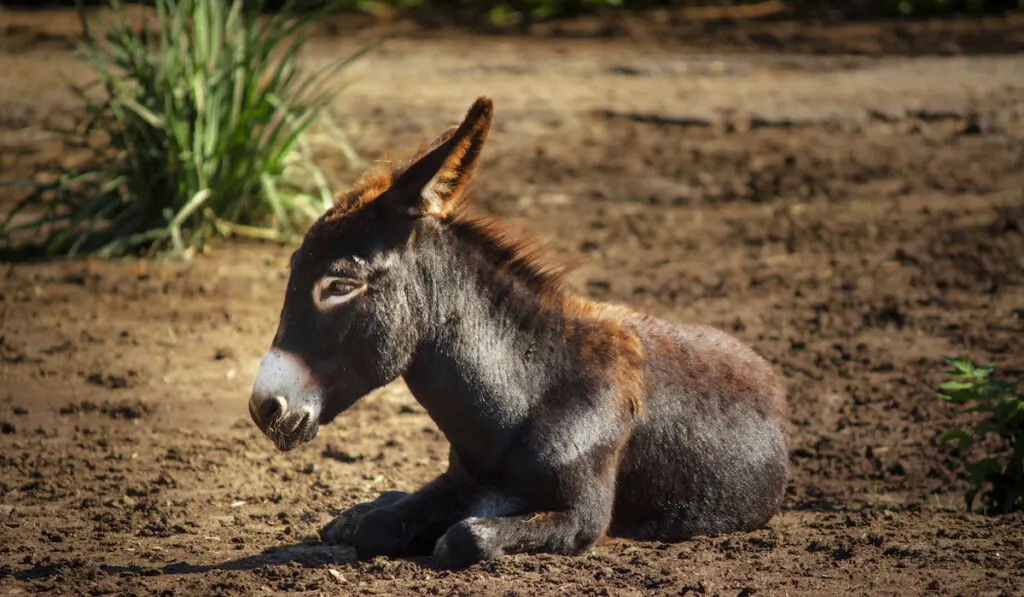
Table of Contents
So what is a Donkey?
Donkeys, also scientifically known as the Equus asinus come in a variety of different sizes, shapes, species, and colors.
They live for about 25 to 30 years in the wild and more or less domesticated with a weight of about 180 to 1,000 pounds and height of 2.6 to 5.2 feet as adults.
Although cute and fun to look at, Donkeys are mainly used for labor in a versatile array of uses including for show, light draught work, or even for children to ride.
Donkeys are highly affectionate and enjoy being social. They look for trust in others including people.
Because they are very social creatures, they will become upset and may even stop eating when deprived of companionship.
Types of Donkeys
There is a wide range when it comes to Donkeys. Much like horses, true donkeys come in a variety of different types.
One of the most common types includes the Grand Noir Du Berry which originates from the Berry region of France.
The Grand Noir Donkey is around 53 to 57 inches in height for males with females ranging from 51 inches.
They are known for having their white/grey color of underbelly, muzzle, and the around their eyes but overall may have light to dark bay brown coat.
In 1993, there were only 80 of these donkeys in domestic and labor uses, since the 2000s that number increased to nearly 600.
Today they are used frequently across the world.
There are many ways to locate and purchase a donkey for your farm including the website Livestock The World which allows for the purchase of all types of animals for sale.
You can expect to spend around $100-500 for each donkey.
Miniature Donkey
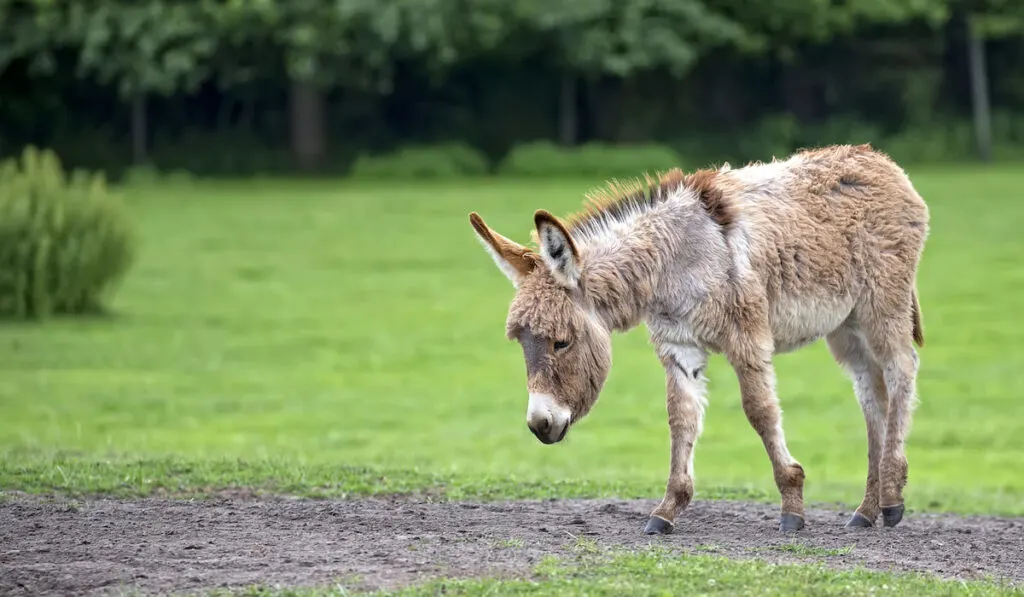
The Miniature Donkey originated from the island of Sardinia and Sicily and comes in all shapes and sizes.
The miniature donkey has one standard; it is unable to reach past 35 inches at the withers which is the ridge between the shoulder blades and the tallest point of the body.
Minature donkeys are also “true donkeys” just in much smaller bodies!
The miniature donkey comes in several colors from chestnut to grey to black and with a wide array of patterns and spots.
This donkey was originally used to turn grinding stones into grain inside a peasant’s house but has recently become popular as pets and breeders, commonly in North America.
Miniature Donkeys are not more than 36 inches(91cm) tall when an adult and weigh 200 to 450 pounds.
They have become popular in recent years and can be bought for between $500 and $700.
These creatures are friendly and kind and love being around other animals as well as people.
Hinny Donkey
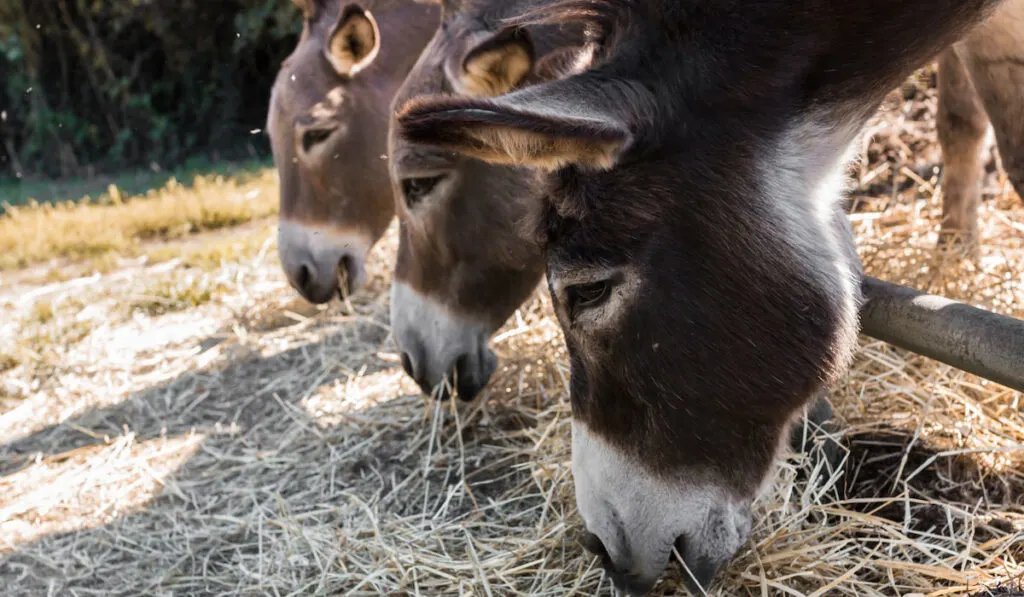
A hinny donkey is the result of breading a female donkey and a male horse. They are not truly a donkey but are, instead, a horse/donkey hybrid.
Hinnies are known to be smaller than other kinds of donkeys.
Because of these differences, it is often difficult to determine the difference between a mule and a Hinny.
Hinnies are frequently difficult to handle because of their high temperament and are usually castrated to allow for lower risk of reproduction.
Hinny donkeys come in a wide range of colors depending on the parents.
This includes plain colors to even printed patterns.
This donkey should not be purchased to used for breeding because of the number of chromosomes a donkey has.
Horses have 64 chromosomes while donkeys have 62.
Because of this mismatched numbers of chromosomes, it is very difficult for them to breed.
The Hinny donkey can be around 24 to 60 inches tall, and weigh around 180 to 1,000 pounds. They cost between $300 and $1000.
Mule
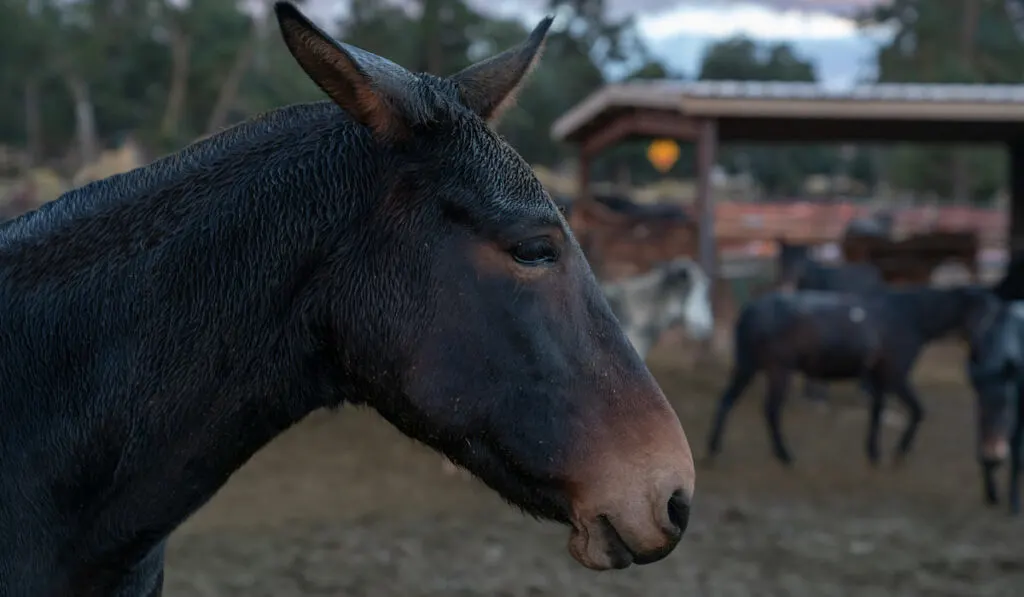
The Mule or Horse mule is a result of breeding female horses and a male donkey, similar to the concept of the hinny, but reversed.
A mule ranges from 35-67 inches in height depending on the size of the parents.
Mules were very popular with the British army and were used in both world wars during the campaigns in India and Asia.
Mules have distinct small ears with tails similar to that of a horse.
They come in colors including black and grey but also bay brown and may have a variety of spots and patterns.
Mules weigh between 51 and 1,000 pounds and cost around $1,000 to $3,000 dollars.
Mules can not commonly reproduce due to their result of being an offspring of a male donkey and a female horse.
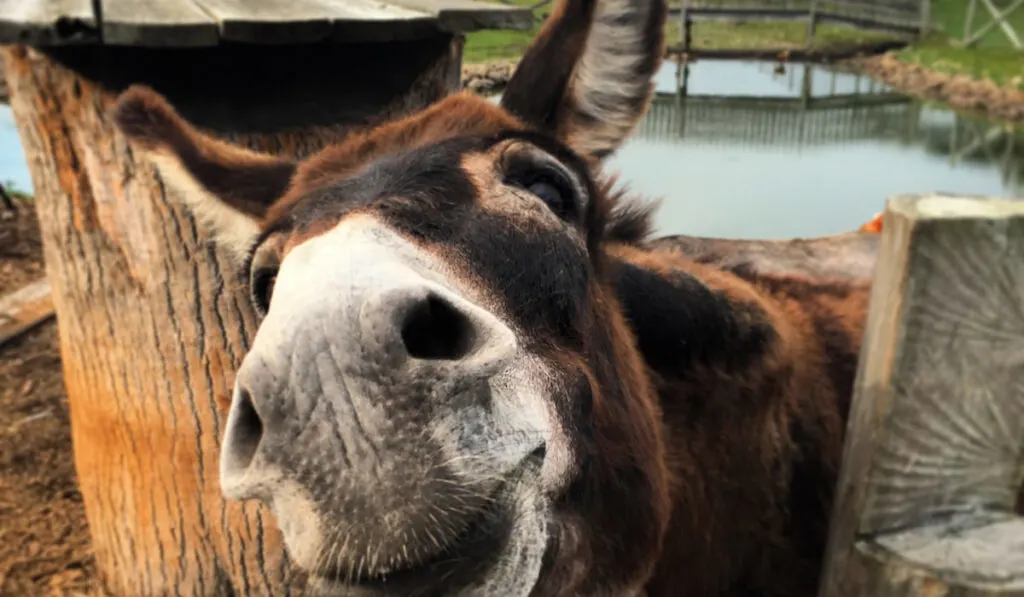
Stabling and Care
Donkeys, no matter what size or breed deserve the utmost care and attention for maximum health and happiness.
This includes their stable environment. When deciding what to set up and use for this there are many different options at hand.
They are pretty versatile in their lifestyle but mostly gain comfort in warm and dry places.
When living as a pet there are different needs and setups.
Much like horses, they enjoy roaming around through grass and high fields.
It is recommended to give them at least one acre of land outside.
They are tricky to handle and enjoy being escape artists.
They can find holes and cracks in a fence or gate which allow for easy escape meaning that it is vital there is high supervision to prevent this.
In addition, they require a stall to get them out of bad weather if they choose.
In spite of being very hardy, many donkeys dislike their feet being wet and enjoy the warm dry places of a covered shelter.
These areas along with their outside space should be covered with a layer of dirt and during colder winter months should be insulated with a layer of straw.
Manure Droppings need daily removal to decrease buildup.
Straw in the stall should be replaced every 2-3 months to keep clean and brushing should be part of a common routine to avoid dirt build-up as well as keeping them soft and clean!
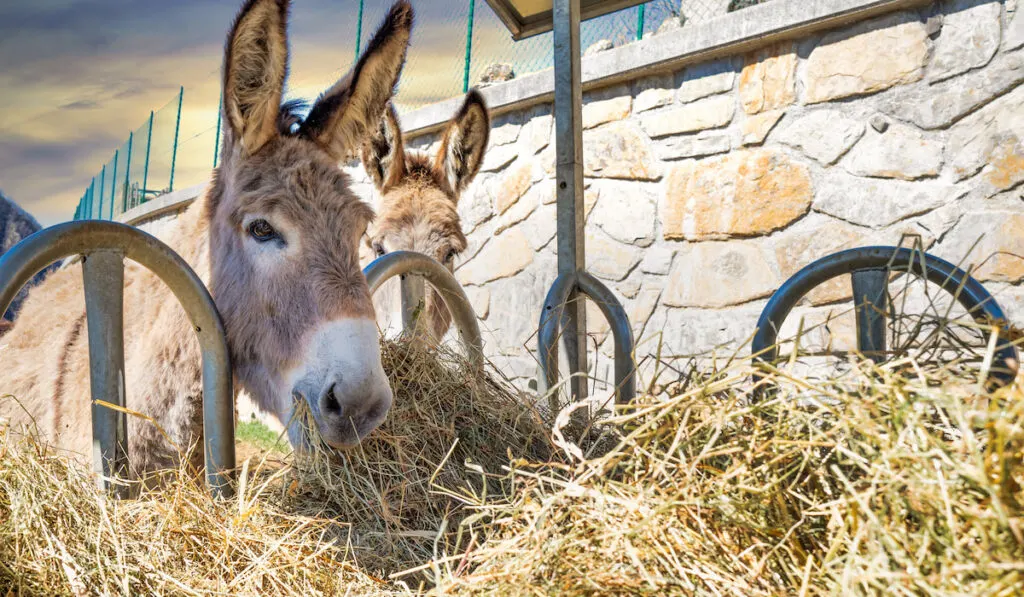
Health and Grooming
Much like a pet dog, donkeys need upkeep and grooming often.
Hoof Care
A donkey’s hooves may grow continuously and they need trimmed at least every 12 weeks to avoid overgrowth.
Dental Care
Their teeth are strong and it is recommended that they are checked out by an equine dentist every two years or more depending on concerns or preference.
Deworming
Worms are a factor and concern when caring for a donkey especially due to their outside living.
These can come in a variety of ways internally including one fermented in the grass and under the dirt.
They should be wormed quarterly or more depending on how they are doing.
Your veterinarian can help advise you of a worming routine appropriate for your area.
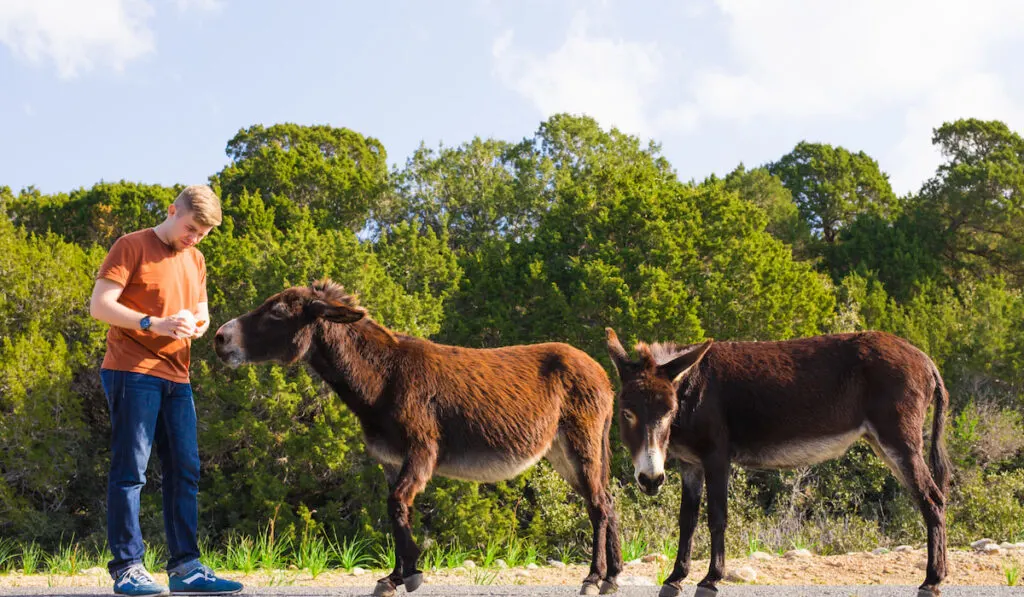
Pest Control
Flies are a nuisance and should be eliminated where possible. You can use an equine fly repellent, careful to avoid the eyes!
Some donkeys have particular issues with flies around their legs causing inflammation and irritation.
Many donkey owners find using large men’s tube socks, with the foot cut out, can serve as effective leg protection against flies.
Grooming & Bathing
You should try to keep your donkey clean to keep them free of bacteria nad bugs. Use shampoo sparingly and keep water at a medium temperature.
Look out for these signs in your donkey to make sure they are healthy:
- Avoiding contact with the owner
- Changing their schedule or habits
- Being motionless or standoffish
- Choking, or labored breathing
- Dull/sick eyes
- Lifeless pale color in their skin
If your donkey has any of these issues, they should be treated quickly by a veterinarian.
Donkey Necessities and Cost
| Necessities | Costs |
| Fencing | Varies |
| Shelter | $100-300 |
| Feedbin | $50-150 |
| Stiff brush | $5-7 |
| Straw/Shavings | $3-7 per bale |
| Deworming medication | $7-20 |
| Shampoo | $10 |
| Salt lick | $3-30 |
Types of Foods
Donkeys enjoy a wide range of foods to eat. Nutrition and variety, however, do depend on the animal and age
Donkeys enjoy hay. There are different kinds including:
- Meadow hay( a mix of grasses)
- Seed hay (a crop of grasses including rye or timothy)
Important note: Ragwort in hay is very dangerous. It can be hard to distinguish but should look like dark long leaves with whitish-green and yellow bottoms, with yellow-orange flowers like leaves on the top.
It is important to find a trusted hay supplier to ensure this does not end up in your donkey’s hay.
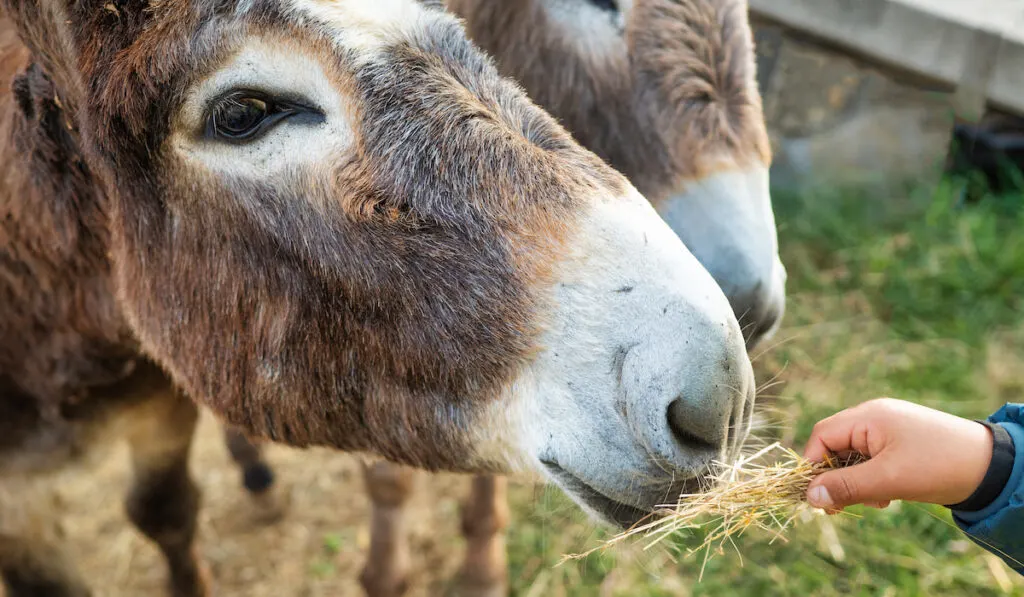
Besides Hay
Besides hay, donkeys may also have a variety of food that provides vitamins and minerals so they can stay healthy and vibrant with a supplement in their diets through seed, and spread.
Donkeys also enjoy salt licks. These can be plain white salt or trace mineral salt.
This is described as a block of salt that is nice for donkeys to lick on as a snack while also providing sodium, iron, calcium, phosphorus, and zinc which enhances bone and muscle health.
Health concerns
It is important to remember that all hay, no matter the type should be of high quality from a trusted seller to prevent disease and illness.
One of the common diseases to look out for that can be caused by old or bacteria-filled foods could be Colic.
Symptoms of this may be:
- Dullness In the eyes or face
- Refusal to eat or lack of appetite
- Fast breathing or accelerated heart rate
- Excessive sweating
- Brick red color on the inside of eyes
- Rolling or pawing at the ground(very serious in donkeys and should be taken in for care urgently)
If you notice any signs that your donkey may be in trouble you should contact your veterinarian for advice and assistance.
Donkey Treat Ideas
Fruits are not just good for people, donkeys love them as well! They make a nutritious treat for them.
Here are some fruits donkeys love to eat as treats.
| Fruit | Cost( Depending on amount) |
| Carrots | 15 cents-$2 |
| Apples | 50 cents-$1 |
| Bananas | 15 cents-$2 |
| Pears | 75 cents-$2 |
| Turnips | $1-$2 |
| Swedes | 50 cents-$2 |
| Lime leaves | 15 cents-$2 |
These fruits are the most popular for donkey’s nutrition, although there are plenty more than may be enjoyed by donkeys.
Overall care
Overall taking care of a donkey can be difficult but this guide is sure to help you start and know the basics!
These tips and facts are here to help your donkey have the best care for its life.
Here is a breakdown of the costs involved in buying a donkey!
| Donkey | Cost |
| Grand Noir Du Berry | $100-500 |
| Hinny | $300-1000 |
| Miniature | $500-700 |
| Mule | $1000-3000 |
I hope this article has given some insight into the lives of donkeys and how to care for them in keeping them healthy and happy throughout their lives with their new owners! To great memories!
Resources
- https://www.thedonkeysanctuary.org.uk/what-we-do/knowledge-and-advice/about-donkeys#
- https://www.thedonkeysanctuary.org.uk/what-we-do/knowledge-and-advice/for-owners/what-to-feed-your-donkeys
- https://opensanctuary.org/article/building-a-good-home-for-donkeys/
- https://farmandanimals.com/how-much-does-a-donkey-cost/
- https://www.equinenow.com/donkey.htm
- https://www.ehorses.com/buy-horse/donkey.html
